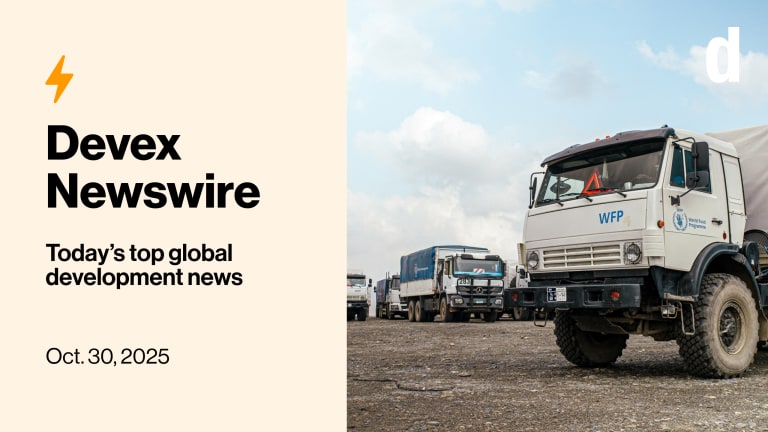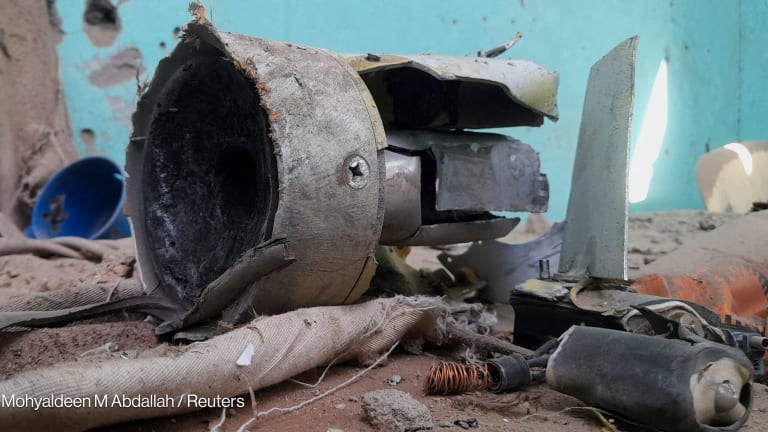Presented by World Bank

Aid observers say a “Rwanda-style” genocide is now unfolding in Sudan.
Also in today’s edition: Michelle Bachelet makes a big announcement at the Paris Peace Forum.
Devastation in Sudan
Nathaniel Raymond, executive director of the Humanitarian Research Lab at the Yale School of Public Health, says his team is watching genocide unfold in real time. Satellite photos show “house-to-house killings” and “bodies on the ground throughout multiple areas of el-Fasher,” carried out by Sudan’s Rapid Support Forces, or RSF.
“In my career, I have never seen a level of violence against [an] area like we are seeing now,” says Raymond, who has tracked atrocities for 25 years. “To put it simply, this is only comparable to Rwanda-style killing.”
RSF leader Mohamed Hamdan Dagalo, better known as Hemedti, once a Janjaweed commander during the early-aughts genocide, later turned his militia into a formal wing of Sudan’s security forces and rose to power after Omar al-Bashir’s fall. Advocates say RSF is now carrying out systematic ethnic cleansing against Darfur’s Black tribes — the Fur, Masalit, and Zaghawa — massacring thousands and taking control of Darfur’s last government-held stronghold in el-Fasher.
“This is not an unexpected catastrophe,” says Kate Ferguson, cofounder of human rights NGO Protection Approaches.
Jeremy Konyndyk, president of Refugees International, says it’s critical for the Trump administration and other key governments to apply pressure on the United Arab Emirates to use its influence with the RSF to stop the killing.
But so far, he says, “The public U.S. statements on this are almost nonexistent. … There is nothing from Secretary [Marco] Rubio so far. There is nothing from President Trump.”
Read: Sudan’s real-time genocide draws comparison to Bosnia and Rwanda
Related: ‘The world, as a whole, has dropped the ball’ on Sudan (Pro)
Spotted in Paris
Devex is on the ground today at the Paris Peace Forum directly across the Seine from the Eiffel Tower. While the biggest celebrities to us personally are the people handing out free coffee on the second floor courtesy of the Colombian Embassy, we’ve also spotted Rémy Rioux, Alice Albright, and the former president of Chile, Michelle Bachelet, who drew a standing-room-only crowd to open the forum. Bachelet also announced that she would be running for the U.N. secretary general role.
My colleague Fiona Zublin tells me the audience stayed big (though a bit emptier) for a session on the United Nations — at which Bachelet was also a panelist.
She said frankly that there are too many summits. “We need to be more strategic.”
Meanwhile, Henry Wang Huiyao, the president of the Center for China and Globalization, called for a reform of the peacekeeping apparatus and expanding the U.N. Security Council to a membership of 21 — all G20 countries plus the African Union.
“It’s not gonna happen,” replied James Steinberg of Johns Hopkins University, predicting that countries won’t voluntarily dilute their own power in the organization. “We’ve been through this for the entire history of the U.N.”
Also at the forum today: Devex Editor-in-Chief Raj Kumar interviewed philanthropist Howard Buffett. You can get more on that conversation in tomorrow’s edition of the Newswire.
+ Got a tip for us on news at the Paris Peace Forum? You can send Fiona a message at fiona.zublin@devex.com.
Bare coffers
Fragile and conflict-affected states get less than 10% of global climate finance — even though they are often the hardest hit.
“The countries most vulnerable to climate change are often the least responsible for it and the least likely to receive the financing they desperately need,” Almut Wieland-Karimi, senior policy adviser to the U.N. Secretary-General’s Peacebuilding Fund, tells my colleague Jesse Chase-Lubitz.
The numbers are stark: 32 of the 70 most climate-vulnerable countries received less than $1 per person for adaptation or disaster risk reduction, according to the IFRC. And a World Bank report found funds went not to the most vulnerable, but to those ready to “absorb and manage adaptation finance.”
At COP30, negotiators are expected to set adaptation indicators and — ideally — finance commitments. But conflicts make investors wary. “The very conditions that make investment urgent also make investors nervous,” says Martin Raiser of the World Bank. “Traditional finance likes stability, data, and predictability.”
Ultimately, experts say resilience is the smart bet. “Innovative finance in fragile states is about making finance fit the context, not the other way around,” Wieland-Karimi says. “Resilience is always cheaper than recovery. … And peace is always cheapest in the end.”
Read: The world’s most fragile states get less than 10% of climate finance
A question of communication
“We screwed up,” said Mark Green, the former USAID administrator. “We were wrong. We were badly wrong, and we failed to engage and make the case over and over again, and now we have to make a new case and make it over and over again.”
That self-criticism came during a panel at a Devex Impact House event held on the sidelines of the United Nations General Assembly — but some in the global development sector point out that the dismantling of USAID might not have been stopped by a better communication strategy.
Still, public opinion matters — and while aid isn’t unpopular with the public, it’s slid way down the agenda, writes Devex Business Editor David Ainsworth. Once a headline issue — remember Make Poverty History and Bono rallying stadiums? — it’s now buried in policy jargon and fundraising clichés. Consultant Matt Watkins calls it out bluntly: “The nonprofit sector’s language has become increasingly coded, more abstract, and — ironically — less meaningful.”
That loss of connection has consequences. In the U.S., USAID’s dismantling was fueled by “rash demands, shock and confusion,” according to The New York Times. In Europe, leaders facing economic strain have slashed budgets, with aid an easy target when public support is weak. A July survey by Focaldata found opinions polarized: While some groups back aid more strongly, others dismiss it entirely, and overall, aid just ranks lower on people’s list of priorities.
Still, there’s a path forward. Norway’s foreign aid chief, Gunn Jorid Roset, points out that Norwegians support the country's generous aid budget because Norad keeps the public informed about results and dilemmas. Focaldata’s research shows that when aid is explained simply and clearly, there’s a “bedrock of goodwill” that politicians can’t ignore.
Read: Did the aid sector really screw up its communications strategy? (Pro)
Related: Why don’t Americans understand aid, and what do we do about it? (Pro)
+ Begin your 15-day free trial of Devex Pro and instantly access our comprehensive suite of resources: expert analysis, insider briefings, extensive funding databases, curated event listings, and a library of exclusive content designed to keep you ahead. Discover all the exclusive content available to Pro members here.
Dying by degrees
Heat is killing more people than ever. Over the past decade, heat-related deaths surged more than 60%, with 546,000 people dying each year from 2012–2021 — up from 335,000 in the 1990s, according to the Lancet Countdown on Climate Change and Health. That’s roughly one person every minute.
Infants and older adults are most at risk. In 2024, both groups faced more than 20 days of heat waves on average — a 300% jump from the late 20th century. China and India saw the largest numbers, but elderly people in Japan, Italy, and the U.S., and infants in Indonesia, Nigeria, and the Democratic Republic of Congo were also heavily exposed.
And heat’s toll goes far beyond mortality, writes Devex Senior Reporter Jenny Lei Ravelo. Wildfire smoke killed 154,000 people in 2024. Food insecurity worsened for 123.7 million people. Extreme heat erased 639 billion work hours — $1.09 trillion in losses.
Many deaths are preventable, but governments are falling short. Only 30% of officials mentioned health and climate change in their speeches at the 2024 U.N. General Debate, down from 62% in 2021. The Trump administration pulled out of the Paris Agreement, scrapped a $4 billion Green Climate Fund pledge, and gutted federal climate staff. USAID and other aid cuts “further increase the vulnerability of populations worldwide to soaring climate hazards,” the report warns.
Meanwhile, fossil fuel keeps expanding. Banks lent $611 billion to oil and gas in 2024, more than to renewables. Fifteen countries — from Saudi Arabia to Venezuela — spent more on fossil fuel subsidies than on health. “If we keep on financing fossil fuels … we know that a healthy future is not possible,” says Marina Romanello, executive director of the Lancet Countdown.
Read: Experts warn of spike in heat deaths as countries backpedal on climate
Three truths and a lie?
Bill Gates published a memo on Tuesday outlining “three truths” on climate he wants everyone to know before COP30: that climate change won’t lead to humanity’s demise, that temperature is not the best way to measure our progress on climate, and that health and prosperity are the best defense against climate change.
Gates pushed against the focus on near-term emissions goals and instead on improving lives and preventing suffering.
The Gates Foundation has invested billions in innovations to reduce global warming, but did not list climate as one of the three main priorities that it will focus on in its next and final 20 years.
The post has sparked criticism from the climate world, especially as it came out on the same day Jamaica was hit by Hurricane Melissa, which is ranked as the strongest storm to ever make landfall on the island.
In other news
A new study says the World Health Organization’s growing dependence on the Gates Foundation as U.S. funding declines is shaping its priorities, a claim both the U.N. health agency and the foundation dispute. [Financial Times]
A U.K. parliamentary committee warned that cutting the development budget will cause devastating consequences globally and that prioritizing defense over the world's most vulnerable damages the U.K.'s soft power and jeopardizes national security. [The Independent]
The wealthiest 0.1% of Americans are responsible for carbon emissions 4,000 times higher than the world’s poorest, Oxfam warns, calling for taxes and tougher limits on the superrich whose lifestyles and investments are driving the climate crisis. [The Guardian]
Sign up to Newswire for an inside look at the biggest stories in global development.








